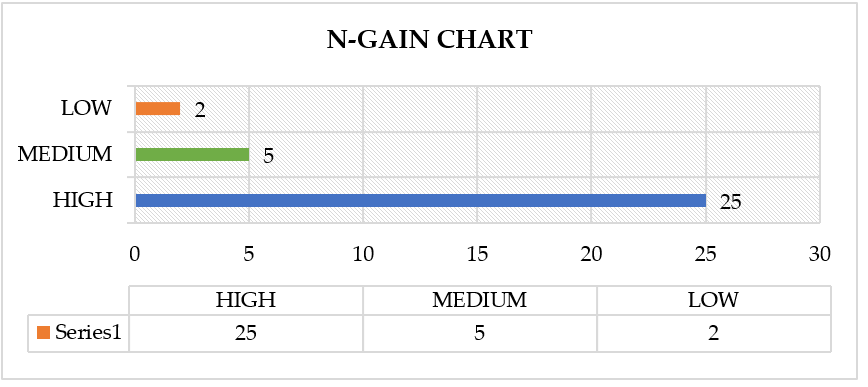Electronic module protist material based on ASICC learning strategies
DOI:
https://doi.org/10.22219/raden.v2i1.20363Keywords:
Scientific argumentation, Electronic module, ASICCAbstract
The process of scientific argumentation skills in biology learning at SMAN 1 Kediri is nonoptimal yet. This study aimed at improving students’ scientific argumentation using ASICC-based electronic modules. This Research and Development employed Plomp development model. The subjects of this study were X graders of MIPA SMAN 1 Kediri which consisted of 32 students. There were three stages of the Plomp model conducted i.e., preliminary research, prototyping, and assessment. The expert validation score gained for subject matter and linguistic was 85% (valid category), the validation score for design and media professionals' validation is 81% with a valid category, the teacher validation score is 93% with a very valid category, and the small group test score is 88% with a very valid category. Implementation of the ASICC-based electronic module had results such as 25 of 32 students got the N-Gain score in the high category, 5 students in the medium category, and 2 students in the low category. The ASICC-based electronic module on protist material is valid and effective to improve the scientific argumentation skills of class X MIPA students in SMAN 1 Kediri.
Downloads
References
Afifah, I. N., Rohmania, Q. N., Primandiri, P. R., Studi, P., & Biologi, P. (2021). The importance of knowing the learning style Of SMAN 1 Kediri. INKESJAR. 380–387. https://proceeding.unpkediri.ac.id/index.php/seinkesjar/article/download/1256/1001/4696
Akbar. (2013). Instrumen perangkat pembelajaran. PT. Remaja Rosdakarya.
Anwar, Y., Susanti, R., & Ermayanti. (2019). Analyzing scientific argumentation skills of biology education students in general biology courses. Journal of Physics: Conference Series, 1166(1). https://doi.org/10.1088/1742-6596/1166/1/012001
Arip, M. A. S. M., Bakar, R. B. A., Ahmad, A. B., & Jais, S. M. (2013). The development of a group guidance module for student self-development based on Gestalt Theory. Procedia - Social and Behavioral Sciences, 84(June), 1310–1316. https://doi.org/10.1016/j.sbspro.2013.06.748
Astira, S., Sajidan, & Dwiastuti, S. (2019). Analysis of argumentation skills in biological learning in senior high school students. Journal of Physics: Conference Series, 1338(1). https://doi.org/10.1088/1742-6596/1338/1/012032
Deane, P., & Song, Y. (2014). A case study in principled assessment design: Designing assessments to measure and support the development of argumentative reading and writing skills. Psicologia Educativa, 20(2). https://doi.org/10.1016/j.pse.2014.10.001
Hake, R. R. (1999). Analyzing change/gain scores. Unpublished.[Online] URL: Http://Www. Physics. Indiana. Edu/~ Sdi/AnalyzingChange-Gain. Pdf, 16(7).
Lorenza, M. A., Budiretnani, D. W. I. A. R. I., Primandiri, P. R., & Farida, E. N. I. (2020). Mengungkap hubungan antara metakognisi dengan keterampilan argumentasi ilmiah Sekolah Menengah Atas Universitas Nusantara PGRI Kediri. http://repository.unpkediri.ac.id/view/creators/PRIMANDIRI=3APOPPY_RAHMATIKA=3A=3A.default.html
Nurhidayati, A., Putro, S. C., & Widiyaningtyas, T. (2018). Penerapan model PBL berbantuan e-modul berbasis flipbook dibandingkan berbantuan bahan ajar cetak pengaruhnya terhadap hasil belajar pemrograman siswa SMK. Teknologi dan Kejuruan: Jurnal Teknologi, Kejuruan, dan Pengajarannya, 41(2), 130–138. https://doi.org/10.17977/um031v41i22018p130
Plomp, T., & Nieveen, N. (2013). Educational design research educational design research. Netherlands Institute for Curriculum Development: SLO, 1–206.
Puspitasari, A. D. (2019). Penerapan media pembelajaran fisika menggunakan modul cetak dan modul elektronik pada siswa SMA. Jurnal Pendidikan Fisika, 7(1), 17–25. http://journal.uin-alauddin.ac.id/indeks.php/PendidikanFisika
Rohmania, Q. N., Afifah, I. N., Primandiri, P. R. (2021). Profil kesadaran metakognitif siswa di SMA Negeri 1 Kediri, perkembangan pendidikan abad 21 semakin berkembang seiring kemajuan ilmu pengetahuan dan teknologi. SINKESJAR, 546–553. https://doi.org/10.29407/seinkesjar.v1i1.1276
Sakti, I., Defianti, A., & Nirwana, N. (2020). Implementasi modul IPA berbasis etnosains masyarakat bengkulu materi pengukuran melalui discovery learning untuk meningkatkan kemampuan berpikir kritis mahasiswa. Jurnal Kumparan Fisika, 3(3), 232–238. https://doi.org/10.33369/jkf.3.3.232-238
Santoso, A. M., Primandiri, P. R., Zubaidah, S., & Amin, M. (2021). Improving student collaboration and critical thinking skills through ASICC model learning. Journal of Physics: Conference Series, 1806(1). https://doi.org/10.1088/1742-6596/1806/1/012174
Schraw, G., & Dennison, R. S. (1994). Assessing metacognitive awareness. Contemporary Educational Psychology, 19(4), 460–475. https://doi.org/10.1006/CEPS.1994.1033
Suwono, H., Yulianingrum, E., & Sulisetijono. (2017). Peningkatan argumantasi ilmiah siswa sekolah menengah atas melalui model pembelajaran ESAR (Engage, Study, Activate, Reflect). Jurnal Ilmu Pendidikan, 23(1), 1–10. https://doi.org/10.17977/jip.v23i1. 10751
Widayanti, F. D. (2013). The importance of knowing student learning styles in classroom learning activities. Erudio Journal of Educational Innovation, 2(1). https://erudio.ub.ac.id/index.php/erudio/article/view/228
Yacoubian, H. A., & Khishfe, R. (2018). Argumentation, critical thinking, nature of science and socioscientific issues: a dialogue between two researchers. International Journal of Science Education, 40(7), 796–807. https://doi.org/10.1080/09500693.2018.1449986

Downloads
Published
How to Cite
Issue
Section
License
Copyright (c) 2022 Qonita Nur Rohmania, Inayah Nur Afifah, F. Fatnatin, Poppy Rahmatika Primandiri, Mumun Nurmilawati, Agus Muji Santoso

This work is licensed under a Creative Commons Attribution-ShareAlike 4.0 International License.
Authors who publish with Research and Development in Education agree to the following terms:
- For all articles published in the Research and Development in Education, copyright is retained by the authors. Authors give permission to the publisher to announce the work with conditions. When the manuscript is accepted for publication, the authors agree to the automatic transfer of non-exclusive publishing rights to the publisher.
- Authors retain copyright and grant the journal right of first publication with the work simultaneously licensed under a Creative Commons Attribution-ShareAlike 4.0 International License that allows others to share the work with an acknowledgment of the work's authorship and initial publication in this journal.
- Authors are able to enter into separate, additional contractual arrangements for the non-exclusive distribution of the journal's published version of the work (e.g., post it to an institutional repository or publish it in a book), with an acknowledgment of its initial publication in this journal.
- Authors are permitted and encouraged to post their work online (e.g., in institutional repositories or on their website) prior to and during the submission process, as it can lead to productive exchanges, as well as earlier and greater citation of published work (See The Effect of Open Access).

This work is licensed under a Creative Commons Attribution-ShareAlike 4.0 International License.







